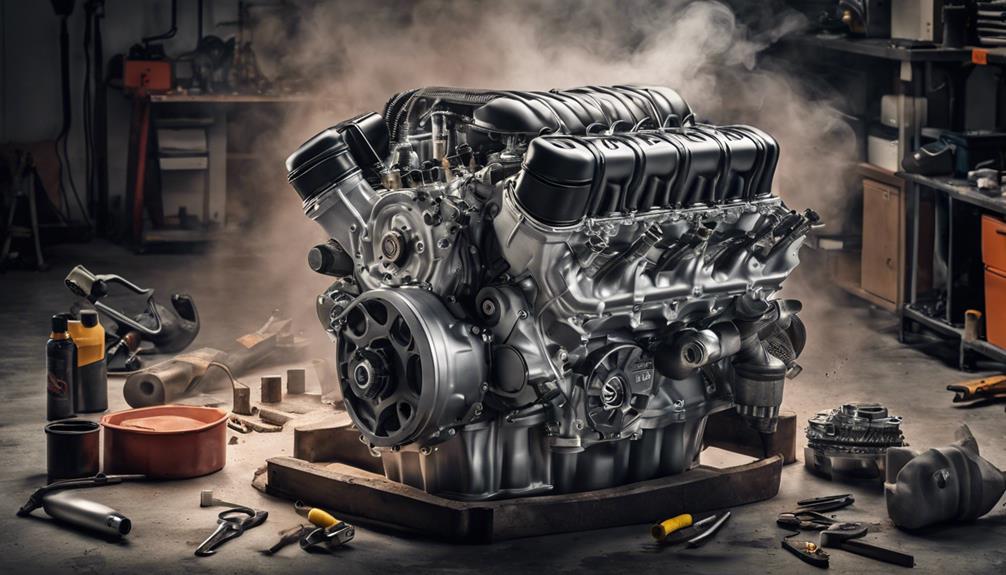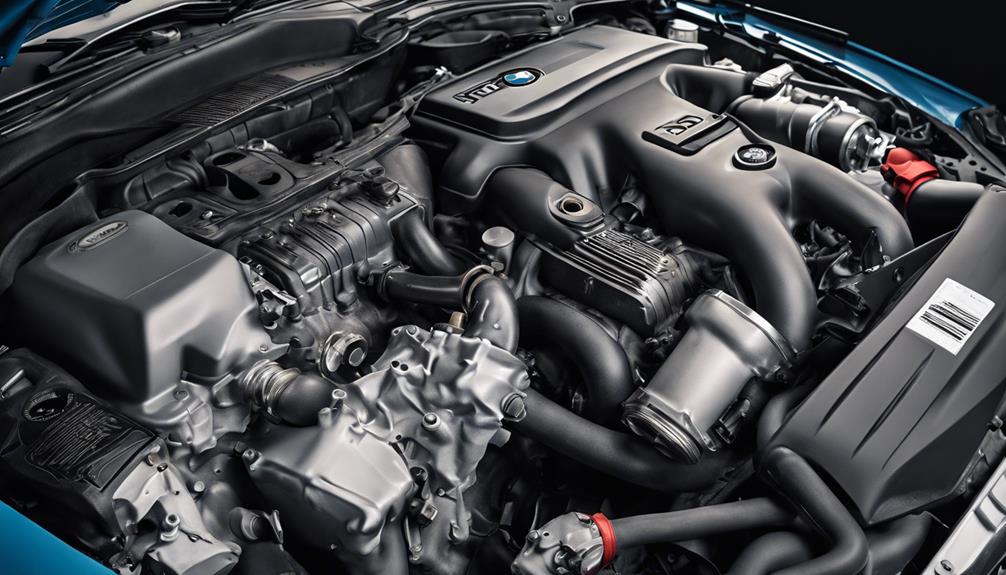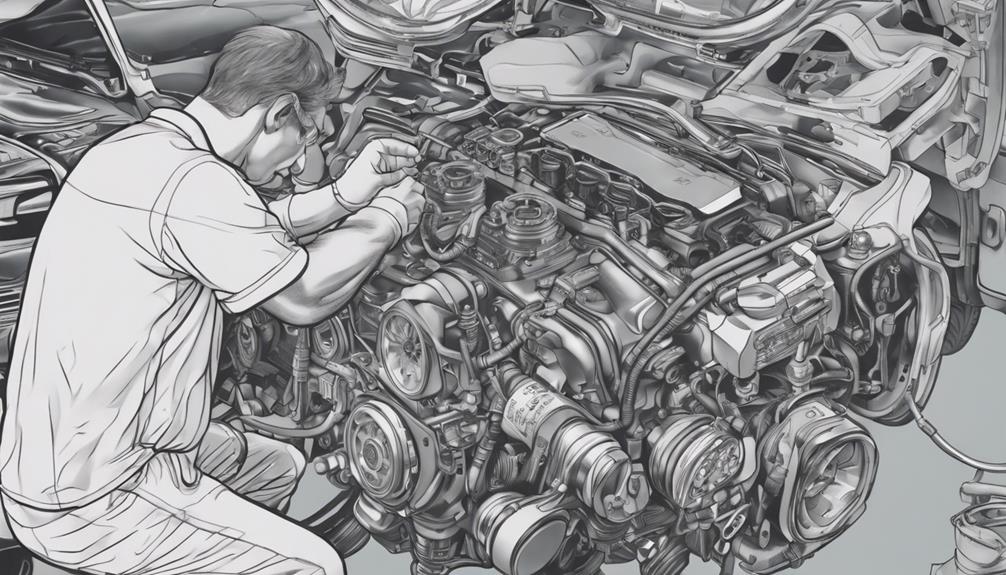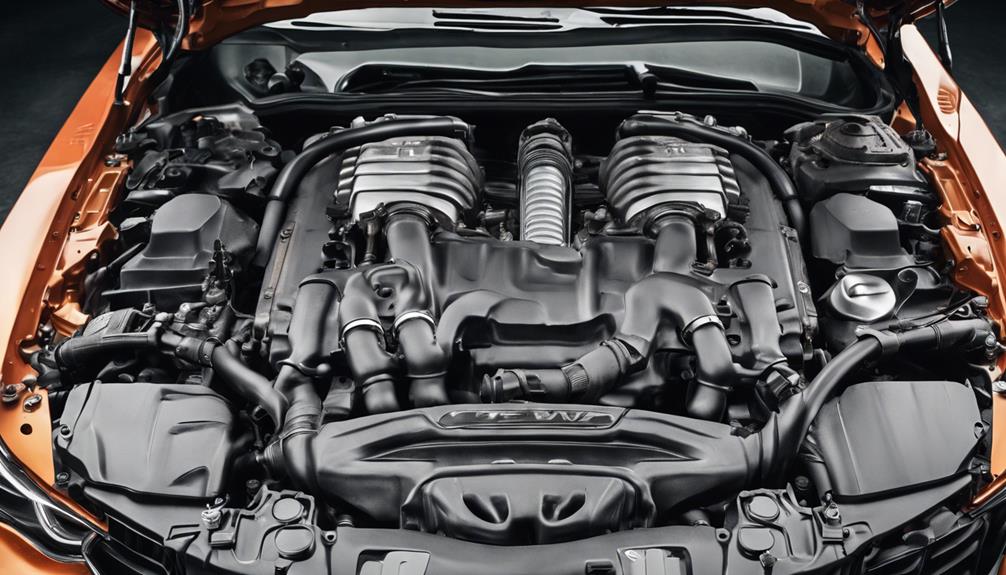If you're driving a BMW M240, it's important to address potential airbag and seat belt recalls promptly for your safety. Keep an eye out for minor faults detectable by diagnostic tools, such as software glitches or sensor malfunctions, to prevent more significant issues down the road. Additionally, be mindful of run-flat tire considerations and remember the significance of the first oil change at 24,000 miles to maintain peak performance. Finally, enjoy the impressive performance of the 3.0-liter Inline-6 engine. Each of these aspects contributes to a smoother driving experience with your M240.
Key Takeaways
- Airbag and seat belt recalls for safety.
- Diagnostic tools detect minor software and sensor faults.
- Run-flat tire replacement challenges.
- First oil change at 24,000 miles crucial.
- Powerful 3.0-liter Inline-6 engine performance.
Airbag and Seat Belt Recalls

If you own a BMW M240i, you should be aware of the significant airbag recall that has affected certain models within this lineup. BMW identified airbag problems as vital safety concerns, prompting the issuance of recall notifications to address potential defects in the airbag system. These recalls were part of a larger initiative to guarantee the safety and well-being of BMW owners. It's essential for you to take these recalls seriously and promptly schedule repairs to maintain safety compliance.
The airbag recall is a critical issue that BMW has prioritized due to its impact on passenger safety. By addressing this recall promptly, you aren't only complying with safety regulations but also ensuring the protection of yourself and your passengers. BMW owners are encouraged to stay informed about any recall notifications and take proactive steps to address them. Your safety is paramount, and by addressing the airbag recall, you're contributing to a safer driving experience for yourself and others.
Minor Faults Detected by Diagnostic Tools
Upon running diagnostic tools on a pre-owned BMW M240i with 14,000 miles, 8 minor faults were detected. These insignificant issues, while not impacting the overall performance of the vehicle, are worth noting for maintenance purposes.
Here are three key points to ponder:
- Software Glitches: Diagnostic tools commonly pick up on software glitches that may not manifest as noticeable problems during regular driving. These glitches could include minor coding errors or sensor miscommunications.
- Sensor Malfunctions: Sensors play an essential role in modern vehicles, and diagnostic tools are adept at identifying sensor malfunctions. These faults could be related to the engine, transmission, or other vehicle systems.
- Electrical Circuit Irregularities: Issues within the electrical circuits can sometimes trigger fault codes in diagnostic reports. While these faults may not be immediately visible, they should be addressed to prevent potential future complications.
Regularly monitoring and addressing these minor faults detected by diagnostic tools can help maintain the BMW M240i's performance and prevent more significant issues down the road.
Run-Flat Tire Replacement
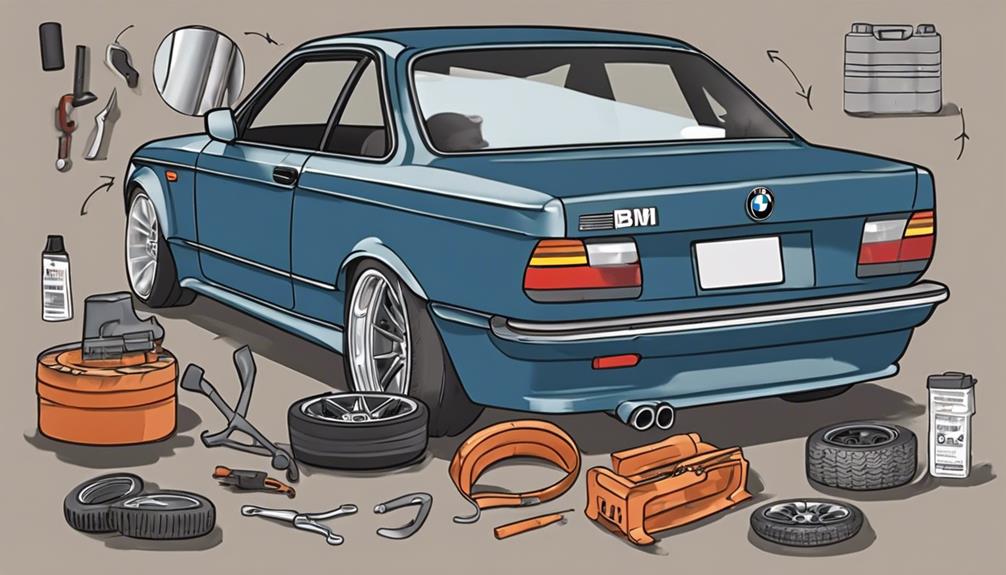
Replacing run-flat tires on your BMW M240i can pose a significant cost due to their specialized design. These tires are engineered to support the vehicle's weight even after a puncture, allowing you to drive a limited distance to find a repair shop. While they eliminate the need for a spare tire, run-flat tires may have limited availability compared to standard tires, potentially affecting replacement options.
To guarantee the longevity of your run-flat tires, it's essential to engage in proper maintenance practices and conduct regular inspections. Understanding the unique characteristics of run-flat tires can empower BMW M240i owners to make informed decisions regarding maintenance and replacements. By staying informed about the benefits and challenges associated with run-flat tires, you can navigate the potential costs and availability issues more effectively, ultimately enhancing your driving experience and peace of mind.
First Oil Change at 24,000 Miles
When approaching the milestone of 24,000 miles, scheduling the first oil change for your BMW M240i is crucial to maintain peak performance and address any potential minor faults detected through diagnostic tools.
Here are three key points to ponder regarding your first oil change at 24,000 miles:
- Regular Maintenance: Performing the first oil change at 24,000 miles is part of the routine maintenance schedule recommended for your BMW M240i to guarantee the engine functions at its best.
- Diagnostic Tool Insights: During the oil change, the diagnostic tool identified 8 faults in the vehicle. While this may seem concerning, these faults were considered insignificant in nature and were addressed promptly.
- Preventive Measures: Monitoring fault codes during routine maintenance, like oil changes, can help detect and address minor issues before they escalate, potentially saving you from more significant problems in the future.
Powerful 3.0-liter Inline-6 Engine
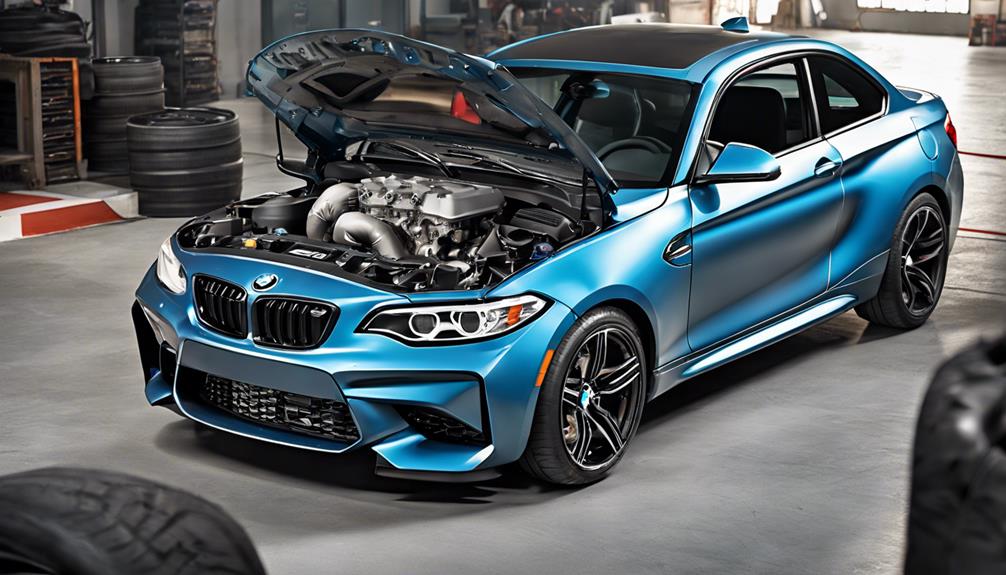
The powerful 3.0-liter inline-6 engine in the BMW M240i offers impressive performance capabilities.
You should analyze the engine's performance to guarantee it meets your expectations.
Check the turbocharger efficiency and evaluate fuel consumption to optimize the engine's functionality.
Engine Performance Analysis
Equipped with a potent 3.0-liter inline-6 engine boasting 335 horsepower, the BMW M240i delivers exhilarating performance and acceleration. When analyzing the engine performance of the M240i, consider the following:
- Impressive Torque: The 3.0-liter engine generates a robust torque of 368 lb-ft, ensuring quick acceleration and dynamic driving experiences.
- Efficient Power Delivery: The 8-speed automatic gearbox complements the engine's power, providing smooth and efficient power delivery for a seamless driving experience.
- Reliability and Driving Pleasure: The engine's design and tuning not only enhance performance but also contribute to the vehicle's overall reliability and driving pleasure, making each journey enjoyable and exciting.
The BMW M240i's engine stands out for its blend of power, efficiency, and reliability, elevating the driving experience to new heights.
Turbocharger Efficiency Check
To guarantee peak performance and reliability of your BMW M240i's potent 3.0-liter inline-6 engine, routine checks on the turbocharger system are essential. The turbocharger plays a crucial role in enhancing the engine's power output by compressing air for combustion efficiently.
Monitoring turbocharger boost levels and exhaust gas temperatures is vital to maintain its efficiency. Issues with turbocharger efficiency can result in reduced power, increased fuel consumption, and even potential engine damage.
Regular maintenance and timely inspections of the turbocharger system can help prevent costly repairs and guarantee the continued high performance of your BMW M240i. By keeping a close eye on the turbocharger, you can enjoy the full benefits of its technology and keep your driving experience excellent.
Fuel Consumption Evaluation
For best fuel efficiency with the powerful 3.0-liter inline-6 engine of the BMW M240i, monitoring driving habits and conditions is crucial. When assessing fuel consumption on your M240i, consider the following:
- Driving Style: Gentle acceleration and maintaining consistent speeds can positively impact fuel efficiency.
- Tire Pressure: Keeping tires correctly inflated reduces rolling resistance, helping in better fuel economy.
- Scheduled Maintenance: Regular servicing, including air filter and spark plug replacements, contributes to peak engine performance and improved fuel consumption.
335 Horsepower Output
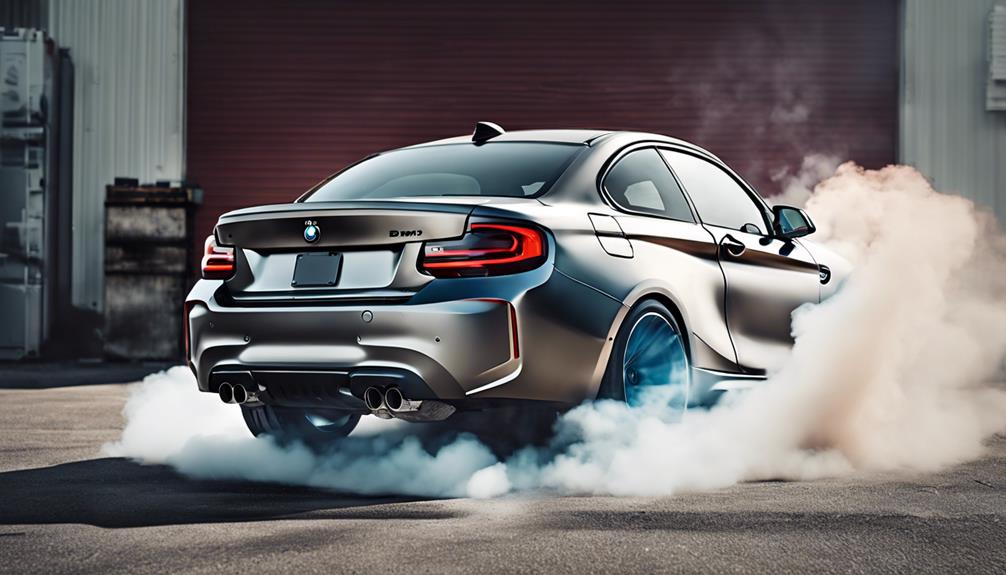
The impressive 335 horsepower output of the BMW M240i's turbocharged 3.0-liter straight-six engine sets a high standard for performance in its class. This substantial horsepower figure contributes considerably to the M240i's remarkable performance capabilities, allowing for quick acceleration and delivering highly responsive driving dynamics. The 335 horsepower not only showcases the M240i's sporty and dynamic character but also plays a crucial role in attracting performance-oriented drivers to this model.
With such a robust horsepower output, the BMW M240i stands out among its competitors, offering a thrilling driving experience that's sure to satisfy enthusiasts. The power generated by the turbocharged engine not only enables impressive straight-line speed but also enhances the overall agility and handling of the M240i, making it a joy to drive on winding roads or even on the track.
Adaptive Suspension System
Experience the dynamic driving capabilities of the BMW M240i's adaptive suspension system, offering customizable damping settings for peak performance on varying road conditions. The adaptive suspension system automatically adjusts shock absorbers to provide top-notch comfort and performance, guaranteeing a smooth ride regardless of the road surface.
Here are three key features of the adaptive suspension system:
- Customizable Modes: Drivers can choose between different suspension modes like Comfort, Sport, and Sport+ to tailor the driving experience to their preferences. Whether you seek a more relaxed ride or crave a sportier feel, the adaptive suspension system has you covered.
- Improved Handling: By continuously monitoring and adjusting the suspension settings, this system enhances the vehicle's handling and stability. It adapts to different driving situations, providing a balanced and dynamic driving feel that instills confidence behind the wheel.
- Peak Performance: The adaptive suspension system guarantees that the BMW M240i delivers top performance by adapting to changes in road conditions. It optimizes the driving experience by fine-tuning the damping settings to suit the specific driving scenario, offering a responsive and engaging ride.
Driver Assistance Technology Features
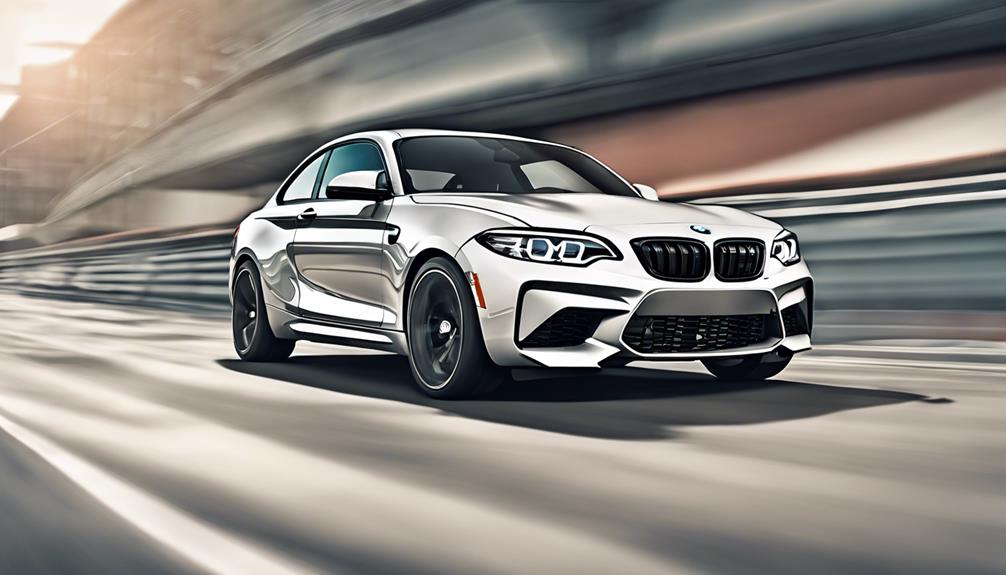
Enhance your driving experience with the BMW M240i's array of advanced driver assistance technology features, designed to elevate safety and convenience on the road.
The M240i comes equipped with various driver assistance features such as lane departure warning and adaptive cruise control, which help keep you safe by providing collision warnings and pedestrian detection capabilities. Additionally, the parking assistance features, including a surround-view camera system and parking sensors, make maneuvering in tight spaces a breeze.
One standout feature is the adaptive headlights that adjust the lighting direction based on your steering input, enhancing visibility during night drives or around corners. These driver assistance technologies collectively contribute to a more secure and hassle-free driving experience, giving you peace of mind on the road.
With the BMW M240i, you can enjoy the benefits of cutting-edge driver assistance technology that prioritizes both safety and convenience, making every drive a pleasure.
Reported Transmission Issues
You may encounter issues with gear shifting and transmission fluid leaks in your BMW M240. These problems can manifest as delayed shifts, grinding sounds, and warning lights indicating transmission issues.
If you notice unusual noises or a burning smell from the transmission area, it's crucial to address these issues promptly to prevent further damage and costly repairs.
Gear Shifting Problems
When encountering gear shifting problems in the BMW M240, it's important to pay attention to any delayed shifts or unusual noises that may indicate underlying transmission issues. Here are three key points to bear in mind:
- Delayed Shifts: If you notice a delay between shifting gears or the transmission feels hesitant, it could be a sign of a gear shifting problem that needs to be addressed promptly.
- Unusual Noises: Strange sounds like grinding or whining during gear shifts can point towards potential transmission issues that require inspection and possible repairs.
- Dashboard Warnings: Transmission warning lights appearing on the dashboard shouldn't be ignored, as they can indicate serious gear shifting problems that need immediate attention to prevent further damage.
Transmission Fluid Leaks
Addressing transmission fluid leaks in your BMW M240 is vital to prevent potential gear shifting issues and transmission damage. Transmission fluid leaks can manifest as visible puddles under the vehicle, low fluid levels, or a burning smell from the transmission.
Timely intervention is essential to avoid further complications and expensive repairs to the transmission system. Regular maintenance checks play a pivotal role in detecting and resolving these leaks before they escalate.
It's highly recommended to consult certified technicians for accurate diagnosis and repair of transmission fluid leaks in BMW M240 models. By taking proactive steps to address transmission fluid leaks promptly, you can guarantee the smooth operation and longevity of your vehicle's transmission system.
Potential Transmission Replacement

If your BMW M240i is showing signs of delayed gear shifts or grinding noises, a potential transmission replacement may be necessary. Here are some key points to ponder:
- Warning Signs: Keep an eye out for other indicators such as transmission fluid leaks, dashboard warning lights related to the transmission, or unusual burning smells emanating from your vehicle. These signs could indicate the need for a transmission replacement.
- Certified Technicians: It's vital to entrust transmission replacements to certified technicians who've the expertise to handle the intricate transmission system of the BMW M240i. Their knowledge guarantees compatibility and proper installation, lessening the risk of future issues.
- Decision Factors: When faced with the choice between rebuilding or replacing the transmission, factors like cost-effectiveness and long-term savings should be evaluated. Seeking advice from professionals can help you make an informed choice tailored to your specific situation.
Overall Desirability of the M240
The desirability of the BMW M240i stems from its powerful engine, versatile drivetrain options, and advanced performance features that cater to various driving preferences.
The allure of the M240i lies in its potent 3.0-liter inline-6 engine, churning out an impressive 335hp, providing exhilarating acceleration and a thrilling driving experience.
Whether you prefer the agility of rear-wheel drive or the added traction of xDrive all-wheel drive, the M240i offers versatility to suit different driving styles and road conditions.
Additionally, the inclusion of adaptive suspension and advanced driver assistance technologies enhances the overall performance and safety of the vehicle, making it a compelling choice for enthusiasts and practical drivers alike.
Despite facing a few recalls, the M240i's enduring desirability is evident in its strong resale value, depreciating only about 38% after 5 years, showcasing its lasting appeal in the market.
If you seek a blend of power, versatility, and advanced features, the BMW M240i stands as a desirable option worth considering.
Frequently Asked Questions
Is the M240 a Good Car?
The BMW M240 is a great car. It offers impressive performance with a powerful engine, advanced features like adaptive suspension, and options for all-wheel or rear-wheel drive. You'll enjoy a thrilling driving experience in this vehicle.
Is the 2017 M240i Reliable?
Yes, the 2017 M240i is reliable. Owners and experts praise its solid performance and low maintenance issues. Its durable 3.0-liter engine contributes to its reputation. With regular upkeep, the M240i stands out as a dependable sports coupe in its class.
Is the 2018 M240i Reliable?
You'll find the 2018 BMW M240i to be reliable, boasting a turbocharged 3.0-liter straight-six engine with 335 horsepower. This model strikes a great balance of power, handling, and comfort, delivering an enjoyable driving experience.
Is M240 Better Than M2?
When comparing the M240 and M2, consider the M240's balance of power and comfort, ideal for daily driving. The M2, focused on performance, excels on the track. Your choice depends on whether you prioritize everyday usability or raw driving experience.
Conclusion
To sum up, while the BMW M240 may have some common problems such as airbag recalls, minor faults detected by diagnostic tools, and potential transmission issues, it still offers a powerful engine, driver assistance technology features, and overall desirability.
With proper maintenance and care, these issues can be addressed and the M240 can continue to be a thrilling and enjoyable driving experience for BMW enthusiasts.






